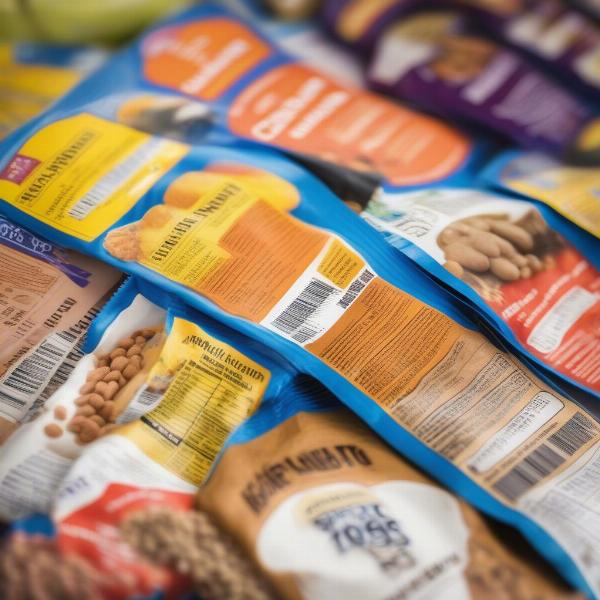Finding the right diabetic dog food in the UK can feel overwhelming. With so many options available, it’s crucial to understand what your diabetic dog needs to stay healthy and happy. This guide provides practical advice and expert insights on choosing the best diabetic dog food for your furry friend in the UK, covering everything from ingredients to portion control.
Understanding Diabetes in Dogs
Diabetes mellitus in dogs occurs when the body doesn’t produce enough insulin or can’t use it effectively. This leads to high blood sugar levels, which can cause various health problems. A crucial part of managing canine diabetes is a specialized diet.
Key Considerations for Diabetic Dog Food
Choosing the right food is vital for regulating blood sugar and overall health. Here are the key factors to consider:
- Low Glycemic Index (GI): Look for foods with a low GI, meaning they release glucose slowly into the bloodstream, preventing spikes in blood sugar.
- High Fiber Content: Fiber helps regulate digestion and slows glucose absorption.
- Complex Carbohydrates: Opt for complex carbs like brown rice and oats over simple sugars.
- Lean Protein: High-quality protein is essential for maintaining muscle mass and overall health. Avoid high-fat protein sources.
- Limited Added Sugars: Avoid foods with added sugars, including artificial sweeteners.
 Comparing different dog food labels for diabetic dogs
Comparing different dog food labels for diabetic dogs
Choosing Diabetic Dog Food in the UK
The UK market offers a wide selection of diabetic dog food. Consult your vet for recommendations tailored to your dog’s specific needs. They can assess your dog’s individual health status and recommend the most appropriate food.
Reading Dog Food Labels
Carefully examine the ingredient list and guaranteed analysis. Look for the following:
- Specific Ingredients: Identify the sources of carbohydrates, protein, and fat.
- Guaranteed Analysis: This section provides the minimum percentages of crude protein, fat, fiber, and moisture.
- Feeding Guidelines: Follow the manufacturer’s feeding guidelines, but adjust portions based on your dog’s individual needs and blood sugar monitoring.
Portion Control and Feeding Schedule
Consistency is key. Feed your diabetic dog at the same time each day, ideally coinciding with insulin injections.
Monitoring Your Dog’s Health
Regular vet check-ups and blood glucose monitoring are essential. Observe your dog for any changes in appetite, thirst, urination, or energy levels.
“Maintaining a consistent diet and monitoring blood sugar levels are crucial for managing diabetes in dogs,” advises Dr. Emily Carter, a veterinary specialist in canine endocrinology. “Work closely with your veterinarian to develop a personalized plan.”
Conclusion
Choosing the right diabetic dog food in the UK requires careful consideration of your dog’s individual needs and a thorough understanding of dietary requirements. By focusing on a low GI, high-fiber diet, and working with your vet, you can help your diabetic dog live a long, healthy, and fulfilling life. Remember to monitor your dog’s health regularly and consult your veterinarian if you notice any changes.
FAQ
- What should I feed my diabetic dog? Feed a diet specifically formulated for diabetic dogs, low in GI, high in fiber, and with controlled levels of protein and fat.
- Can I give my diabetic dog treats? Choose treats specifically designed for diabetic dogs or offer small portions of healthy, low-sugar options like vegetables.
- How often should I feed my diabetic dog? Feed your dog at consistent times each day, ideally coinciding with insulin administration.
- What are the signs of low blood sugar in dogs? Signs include weakness, tremors, lethargy, seizures, and collapse.
- How can I monitor my dog’s blood sugar at home? Your veterinarian can teach you how to use a glucometer to monitor blood sugar at home.
- Is it expensive to feed a diabetic dog? The cost varies depending on the specific food and your dog’s size, but specialized diabetic dog food is generally more expensive than regular dog food.
- Can diabetes in dogs be cured? While diabetes can’t be cured, it can be managed effectively with proper diet, exercise, and medication.
About ILM Dog
ILM Dog is your trusted resource for expert advice on dog care and nutrition. We offer comprehensive information on dog breeds, health, training, nutrition, grooming, and much more. Our expert team is dedicated to providing practical, reliable advice to help you provide the best possible care for your canine companion. From choosing the right dog breed to navigating health concerns, ILM Dog offers valuable insights and resources for every stage of your dog’s life. For personalized advice or inquiries, please contact us at [email protected] or +44 20-3965-8624.